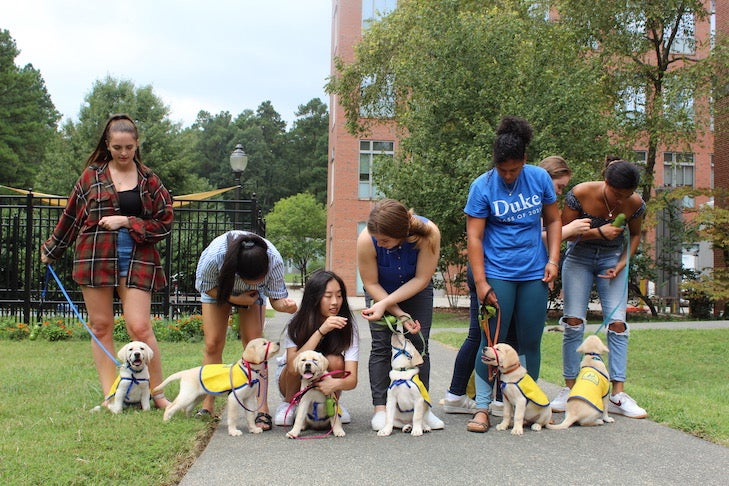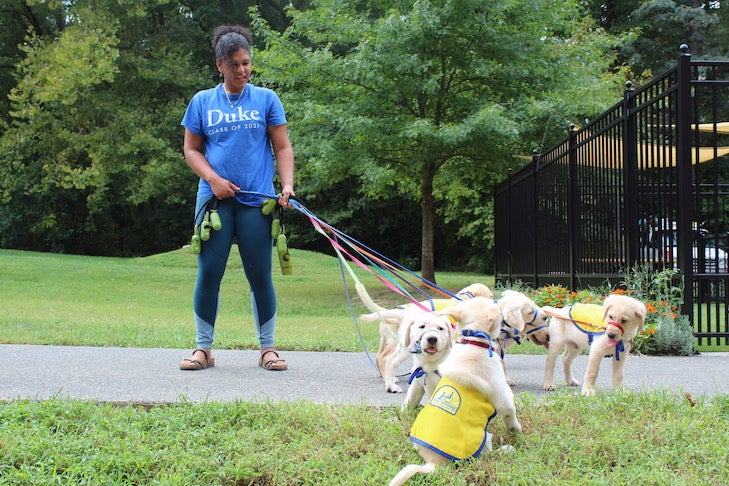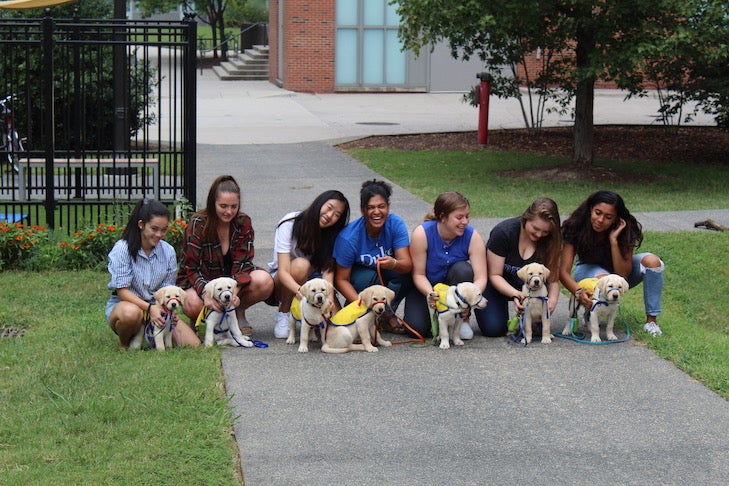
|
As anyone who follows higher education knows, Duke University has a seriously rigorous admissions policy. But for seven new students who matriculated this fall, the standards were a little different: They only needed to have four legs, and willing, giving hearts.
Three pairs of yellow Labrador Retriever siblings, plus one other puppy from a separate litter, came from Canine Companions for Independence (CCI) to enroll in Duke University’s newly inaugurated “Puppy Kindergarten” in September.
The Puppy Kindergarten, the first on-campus college program of its kind, is part of the Duke Canine Cognition Center, a partner to CCI for a decade, according to the Puppy Kindergarten’s Director Vanessa Woods. Similar to Head Start for humans, the program is designed to give the puppies a better chance at completing training successfully, and to add to the number of available service dogs, for which there is a constant and growing need.
Finding Star Students
“Becoming an assistance dog is like going to college,” says Brian Hare, a professor in Duke’s Center for Cognitive Neuroscience and Director of the Duke Canine Cognition Center. “It’s tough to get in, and not everyone graduates.”
“We want to identify those features that are going to be linked to success,” added Brenda Kennedy, DVM, MS, and National Director of Canine Health and Research for Canine Companions. This will help us make decisions at an earlier point, which will mean we can place more service dogs and help more people with disabilities.”

Raising Service Dogs Right
As with children, providing dogs with the right tools at a young age is key, specifically during puppies’ periods of brain elasticity and rapid development, between the ages of 8 and 20 weeks old.
“The long-term objective is to increase the number of assistance dogs available,” Woods says. “As they are trained to become assistance dogs, they will also be studied and assessed on how rearing strategies affect the behavior and cognitive development of service dogs.”
How different, then, is the rearing strategy for service dogs, and what are those correct tools? Unbound affection, according to the scientists. Lots of it.
Traditionally, Woods says, puppies designated for the service dog track go to a puppy raiser after weaning at eight weeks. There, they might be crated all day while the caregiver is at work, or become bonded to one family, in the manner of a pet.
“But what happens if we completely saturate them with love and attention, and expose them to lots of different people?” Woods asks. “Like children, do they get more flexible?”
Puppy socialization is one of the most significant factors that the experts will track through the dogs’ biomarkers this fall semester as they set them on their journey. Already, for instance, they’ve determined that these happy service dogs-to-be exhibit four times the oxytocin levels of household pets.
Tapping Into Pups’ Potential
The Puppy Kindergarten has the backing of the National Institute of Health (NIH), who provided a five-year grant after the study underwent a pilot program. More than 100 Duke University students volunteer their support in the form of walks, cleaning up, and running the puppies through a range of cognitive games and aptitude tests. In addition, the entire campus of students is welcome to drop in for a cuddle with the service dogs in training any time, and volunteers may opt to apply for a more involved role. To that end, the program, even in its infancy, has seen plenty of unexpected benefits.

“The response from the students and community has been incredible, specifically with the puppy volunteers,” Woods says. “Duke students tend to be overcommitted and over-scheduled, and we thought having to pick up poop and keep the puppies from eating stuff might negatively impact them. But it’s been incredibly mindful and beneficial for them instead. It keeps them off social media, and completely focused on and caring for a really small creature. Of course, it helps that the puppies themselves are always in the moment.”
As just one more added benefit of the Puppy Kindergarten program, the pups regularly circulate at the campus mental health and wellness center, where the handlers take them to the pediatrics wing to help with doctor and nurse burnout.
A Bittersweet Graduation
In fact, the only negative aspect of the program so far has come when the campus has to say goodbye to the puppies at 20 weeks. At that time in their development, the pups go off to foster homes for additional assistance training, and the Duke community tearfully bids them goodbye.
The cohorts, as Woods calls the classes of puppies, do all come back to say hello, however. North Carolina’s Triangle Community is very tightly knit, and those neighbors who volunteer to take in the puppies for assistance training take their responsibilities seriously, including making sure to make return visits to campus.
In turn, the Duke Canine Cognition Center values the local community, and the staff is always looking for regional puppy raisers who want their dogs to have “a Duke education,” as Woods puts it. These dogs serve as subjects in various projects, all for the benefit of themselves and their larger canine and human families.

Local humans in the Durham area are welcomed to volunteer as foster puppy raisers. The current seven puppies have homes to go to at the end of this semester, but a new class convenes next semester, with ten more puppies on-boarding at eight weeks to start the study all over again. Those soon-to-be Blue Devil pups aren’t spoken for yet — but that likely won’t be the case for much longer. If you are interested in becoming a Canine Companions puppy raiser, please contact 1-800-572-BARK or go to www.cci.org/raise.

